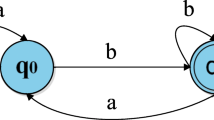Abstract
Reversible languages are a class of regular languages that stands at the junction of several domains. While quantum reversible regular grammars are a special class of fuzzy regular grammars, the algebraic characterizations of quantum reversible regular languages have not been studied so far. This paper establishes quantum reversible fuzzy grammars and fuzzy (hyper-) regular grammars, and presents that the set of quantum reversible regular languages coincides with the set of all the quantum reversible hyper-regular languages. Moreover, it is shown that the set of quantum reversible regular languages coincides with that of quantum languages accepted by quantum reversible fuzzy automata. Particularly the algebraic properties of quantum reversible fuzzy grammars are discussed.
This work is supported by Fund of China Scholarship Council (No. 201708515152) and Graduate Educational Reform Project of Southwest Petroleum University (No.18YJZD08) and National Natural Science Foundation of China (Grant No. 11401495).
Access this chapter
Tax calculation will be finalised at checkout
Purchases are for personal use only
Similar content being viewed by others
References
Asveld, P.R.J.: Fuzzy context-free languages-part 1: generalized fuzzy context-free grammars. Theoret. Comput. Sci. 347(1–2), 167–190 (2005)
Axelsen, H.B.: Clean translation of an imperative reversible programming language. In: Knoop, J. (ed.) CC 2011. LNCS, vol. 6601, pp. 144–163. Springer, Heidelberg (2011). https://doi.org/10.1007/978-3-642-19861-8_9
Axelsen, H.B., Glück, R.: A simple and efficient universal reversible turing machine. In: Dediu, A.-H., Inenaga, S., Martín-Vide, C. (eds.) LATA 2011. LNCS, vol. 6638, pp. 117–128. Springer, Heidelberg (2011). https://doi.org/10.1007/978-3-642-21254-3_8
Bennett, C.H.: Logical reversibility of computation. IBM J. Res. Dev. 17(6), 525–532 (1973)
Chaudhari, S.R., Komejwar, D.D.: On fuzzy regular grammars. Adv. Fuzzy Math. 6(1), 89–104 (2011)
Cheng, W., Wang, J.: Grammar theory based on quantum logic. Int. J. Theor. Phys. 42(8), 1677–1691 (2003)
Costa, V.S., Bedregal, B.: Fuzzy linear automata and some equivalences. TEMA (São Carlos) 19(1), 127–145 (2018)
Deufemia, V., Paolino, L., de Lumley, H.: Petroglyph recognition using self-organizing maps and fuzzy visual language parsing. In: 2012 IEEE 24th International Conference on Tools with Artificial Intelligence, vol. 1, pp. 852–859. IEEE (2012)
Li, L., Li, Y.: On reversible fuzzy automata. In: Quantitative Logic And Soft Computing, pp. 315–322. World Scientific (2012)
Li, Y.M.: Finite automata based on quantum logic and monadic second-order quantum logic. Sci. China Ser. F: Inf. Sci. 53(1), 101–114 (2010)
Lombardy, S.: On the construction of reversible automata for reversible languages. In: Widmayer, P., Eidenbenz, S., Triguero, F., Morales, R., Conejo, R., Hennessy, M. (eds.) ICALP 2002. LNCS, vol. 2380, pp. 170–182. Springer, Heidelberg (2002). https://doi.org/10.1007/3-540-45465-9_16
MacLean, S., Labahn, G.: A new approach for recognizing handwritten mathematics using relational grammars and fuzzy sets. Int. J. Doc. Anal. Recogn. (IJDAR) 16(2), 139–163 (2013)
Mordeson, J.N., Malik, D.S.: Fuzzy Automata and Languages: Theory and Applications. Chapman and Hall/CRC (2002)
Nielson, M.A., Chuang, I.L.: Quantum Computation and Quantum Information. Cambridge University Press, Cambridge (2000)
Feynman, R.P.: Quantum mechanical computers. Found. Phys. 16(6), 507–531 (1986)
Shor, P.W.: Algorithms for quantum computation: discrete logarithms and factoring. In: Proceedings 35th Annual Symposium on Foundations of Computer Science, pp. 124–134. IEEE (1994)
Silva Farias, A.D., de Araújo Lopes, L.R., Bedregal, B., Santiago, R.H.N.: Closure properties for fuzzy recursively enumerable languages and fuzzy recursive languages. J. Intell. Fuzzy Syst. 31(3), 1795–1806 (2016)
Thomsen, M.K., Glück, R., Axelsen, H.B.: Reversible arithmetic logic unit for quantum arithmetic. J. Phys. A: Math. Theor. 43(38), 382002 (2010)
Van de Snepscheut, J.L.A.: What Is Computing All About? pp. 1–9. Springer, New York (1993).https://doi.org/10.1007/978-1-4612-2710-6
Xin, T., et al.: Nuclear magnetic resonance for quantum computing: techniques and recent achievements. Chin. Phys. B 27(2), 020308 (2018)
Ying, M.: Automata theory based on quantum logic II. Int. J. Theor. Phys. 39(11), 2545–2557 (2000)
Ying, M.: A theory of computation based on quantum logic (I). Theor. Comput. Sci. 344(2–3), 134–207 (2005)
Yokoyama, T., Axelsen, H.B., Glück, R.: Principles of a reversible programming language. In: Proceedings of the 5th Conference on Computing Frontiers, pp. 43–54. ACM (2008)
Author information
Authors and Affiliations
Corresponding author
Editor information
Editors and Affiliations
Rights and permissions
Copyright information
© 2019 Springer Nature Singapore Pte Ltd.
About this paper
Cite this paper
Jin, J., Li, C. (2019). Quantum Reversible Fuzzy Grammars. In: Sun, X., He, K., Chen, X. (eds) Theoretical Computer Science. NCTCS 2019. Communications in Computer and Information Science, vol 1069. Springer, Singapore. https://doi.org/10.1007/978-981-15-0105-0_10
Download citation
DOI: https://doi.org/10.1007/978-981-15-0105-0_10
Published:
Publisher Name: Springer, Singapore
Print ISBN: 978-981-15-0104-3
Online ISBN: 978-981-15-0105-0
eBook Packages: Computer ScienceComputer Science (R0)





